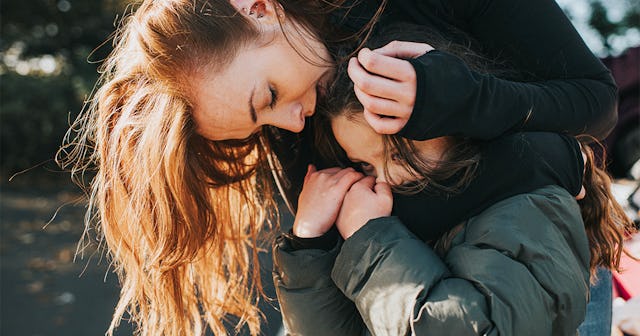Stop Telling Me My Kids Will Be Fine
There’s no denying that the pandemic is impacting them.

Sitting in the school pickup line, my mind starts racing. It is the first quiet moment of my day – the baby is contentedly gazing out the window from her carseat and my toddler is enjoying some screen time. My body is my own and I have space to think. Years ago this was my sliver of afternoon peace, before the evening chaos. But these days my mind is never quiet. I sit watching the flood of masked kids and teachers exit the school as I wave at a familiar mom through the window, and worry takes over.
I worry about my baby’s separation anxiety. Conceived before I knew the world was going to be shut down, and born in the middle of pandemic holiday season round one, she knows the mailman better than some family and close friends. She has never been to a crowded restaurant, an airport, or a museum. She has only been whisked through the grocery store on occasion, or hidden in the corner of the gym at her brother’s basketball games where she is “far enough away” from people.
She has missed out on the bottom half of most faces – unable to soak in those big, rare, genuine smiles that babies create, that make them feel safe. She is kind of like this secret little person that only two or three people outside of our house really know – and I am worried that she has missed out on a lot of life and love.
I worry about my four-year-old’s speech delay. All hail the power of the masks but trying to teach a child how to articulate with your mouth covered is like teaching sign language in a pair of mittens. With virtually no effective speech modeling in any public place, most of the modeling that she gets is at home. This consists mostly of fragmented sentences and mumbled curse words, mixed with a healthy amount of inappropriate quotes from her eight-year-old brother’s YouTube shows — which she is, of course, starting to pick up. It’s probably a good thing that the neighborhood girls can’t understand her when she innocently and without any understanding of the context asks them if they are “hungry for some man meat.” But I worry about her increased frustration when I am not around, and I wonder if things would be different if the world hadn’t changed.
I worry about my six-year-old’s ability to integrate back into society. Like someone else I know (me), he has become a little too comfortable under a blanket on the couch, soaking up the stale living room air, able to avoid unwanted social interaction and scratchy pants. At this stage it takes a lot of effort (bribery) to get him to his basketball practice — where he huffs up and down the court like a chain smoking asthmatic because we have spent the last two years replacing indoor trampoline parks with Minecraft marathons.
He has lost the ability to transition easily between places and activities because there has been so little consistency for so long. Between the exposures, the shutdowns, and the cancellations, the goal posts are always changing. He goes long periods of time staying comfy at home and again, like me, he forgets that real life is cool too.
I worry about my eight-year-old’s socialization. I have declined countless requests by my hyper-extroverted third grader to have friends over and attend gatherings, and every time he is left feeling frustrated and confused. We even resorted to buying him an iPod touch so that he could chat on kids messenger with a few of his besties when he was lonely — which quickly escalated to a video chat tour of our house while I was trying to shave my mustache mid-Saturday morning.
He’s desperate for peer connection and normal fun. He needs space from his younger siblings, and wants to execute some independence. So when he is acting out and yelling, “This sucks!” I have to remember that he’s right, and he needs more.
I worry that kids are being raised by depleted parents. At this point, if you are not at least mildly depressed, then I have to wonder if you are a sociopath. I am irritable, impatient, and burnt out. I have no idea how to give myself enough of what I need right now, so I know that although I am doing my very best, I am not giving my kids all they deserve. They must see the stress on my face and hear it in my voice. I worry about how they interpret all of it, and how growing up in a time of fear and uncertainty will affect them later in life.
So, when I tell you that I am worried about my kids, I need you to hear me. I need you to remember that although kids are resilient, the mental health industry is flourishing today largely because of traumas and life disruptions that take place during childhood.
Stop telling me that my kids will be fine.
Instead, tell me I am doing a good job. Validate what I am feeling and tell me that parenting during a pandemic is really hard and stressful. Say that you are here for me if I need to cry, vent, or scream. Offer to take one of my kids to the playground or ask how you can help. Because although research shows that my kids will live through this pandemic — we don’t know if they will be fine yet, and I am worried sick about them.
Samm Burnham Davidson is an ex-lawyer mom of four who swears a lot. She lives in Beverly, Massachusetts and can be found on Instagram @sammbdavidson.